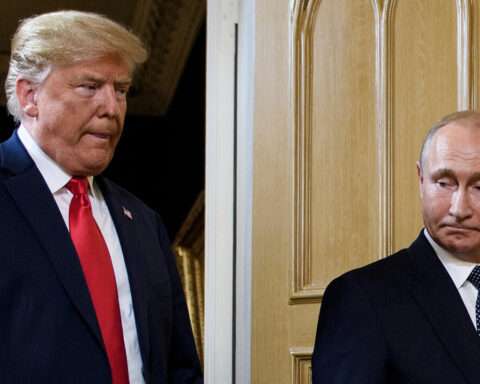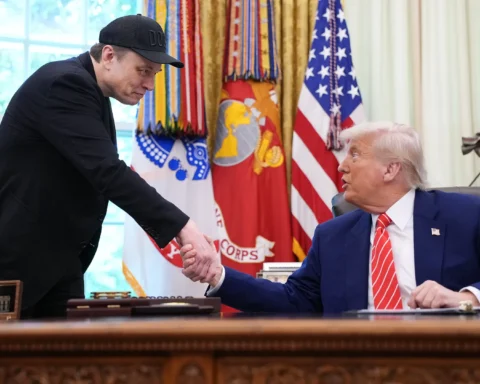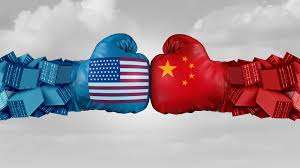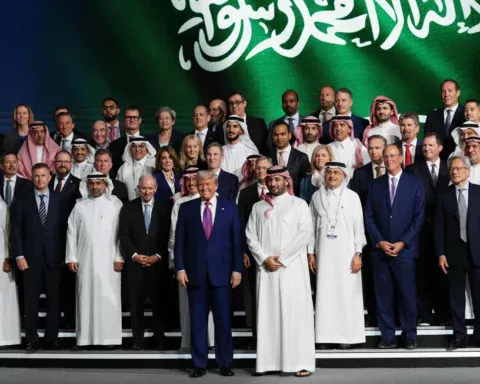SEOUL, SOUTH KOREA — South Korean calls to acquire nuclear weapons, which were subdued for the past year following steps to strengthen the U.S.-South Korea alliance, are once again bubbling to the surface ahead of the possible return of former U.S. President Donald Trump.
Trump, who appears locked in a tight race with President Joe Biden as November’s election approaches, sparked concern this week after making comments that many Korean media interpreted as a threat to pull U.S. troops from South Korea.
In an interview with Time magazine, Trump lamented that U.S. troops are “in a precarious position” — a reference to nuclear-armed North Korea — and said Seoul should pay much more for U.S. protection.
“Why would we defend somebody … and we’re talking about a very wealthy country,” asked Trump, who elsewhere in the interview said U.S. troops were “in a lot of places they shouldn’t be.”
Those kinds of statements are not new. Trump has long questioned the value and necessity of the U.S. military presence in South Korea.
Trump’s supporters say the comments are simply a negotiating tactic meant to persuade South Korea to pay more for the cost of hosting approximately 28,500 U.S. troops. Trump, they insist, does not intend to abandon Seoul.

South Koreans appear less certain about Trump, who once said he “could go either way” on the idea of U.S. troops staying in South Korea.
Many are also concerned Trump could pursue a deal with North Korean leader Kim Jong Un that would effectively recognize the North as a nuclear weapons state.
“We can’t allow this. We must have our own nuclear arsenal, in a limited sense,” Yoon Sang-hyun, a five-term conservative lawmaker, said in a Facebook post this week.
Conservative South Korean newspapers have also begun publishing articles reassessing the idea of nuclear arms — an idea once considered unthinkable.
“The level of concern is really high,” said a researcher at a government-linked think tank in Seoul, who supports South Korea considering nuclear weapons in certain Trump-related scenarios.
“Almost every research institution has a project on preparations for the Trump administration,” said the researcher, who noted growing support among colleagues for acquiring a nuclear deterrent.
Many, including the Seoul-based academic, are hesitant to publicly disclose their openness to attaining nuclear capabilities, seeing little incentive to make statements that would risk antagonizing the current or potential leaders of a country that South Korea has relied on for protection for over 70 years.
Public support
If South Korea ever pursues a nuclear arsenal, the decision will come with massive economic, reputational and regional security risks.
Not only could the move upend South Korea’s alliance with the United States, but it could also prompt others in the region to pursue similar weapons, invite international economic sanctions, and would almost certainly elicit a fierce reaction from China, according to analysts.
Despite such barriers, opinion polls consistently indicate between 60% to 70% of South Koreans support their country developing nuclear weapons.
Even many national security experts, who are presumably more aware of the consequences, back such a move.
According to a poll released this week by the Washington-based Center for Strategic and International Studies, 34% of South Korean elite support acquiring nuclear weapons. That support likely would increase significantly if Trump wins in November, the poll found.
Kim Gunn, who will soon begin a term in South Korea’s National Assembly after recently stepping down as the country’s top nuclear envoy, said he can “fully understand” the sentiment of wanting a nuclear deterrent, considering North Korea’s development of tactical nuclear weapons.
But Kim does not advocate for acquiring nuclear weapons. Instead, he says, it is vital that the South Korean public be assured that the U.S.-South Korean alliance is “well-prepared” to cope with any eventuality.
Last January, South Korean President Yoon Suk Yeol made global headlines when he suggested South Korea could easily develop its own nuclear arms if the security situation with North Korea worsens.
At the time, South Korea was seeing an unprecedented wave of mostly conservative academics, ex-officials and other commentators calling for nuclear weapons.
Reassurances
Those calls subsided after Yoon and Biden agreed in April 2023 to strengthen the U.S. defense commitment to South Korea in a document known as the Washington Declaration.
In the statement, the United States vowed to deploy more “strategic assets,” such as nuclear-capable submarines, long-range bombers and aircraft carriers, to South Korea. In return, South Korea reaffirmed it would not pursue nuclear weapons.
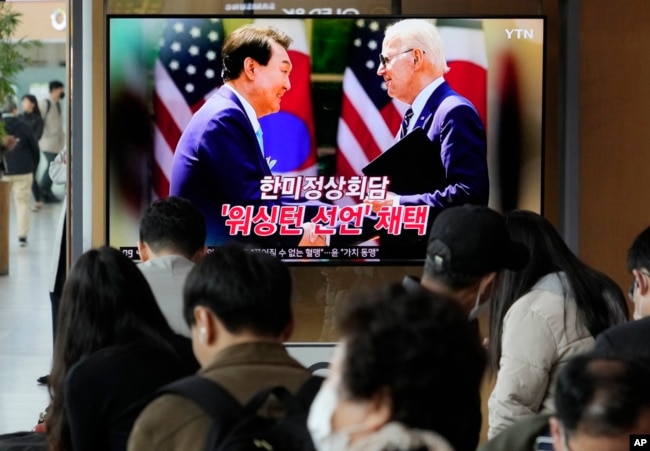
“The problem is if Trump comes back to the White House, he will probably undermine the very basic pillars of extended deterrence — that is, the deployment of strategic assets and joint military exercises,” said Park Won-gon, a professor at Seoul’s Ewha University.
As president, Trump often slammed what he said were provocative and expensive military exercises with South Korea. During his first summit with Kim in June 2018, Trump unilaterally suspended what he referred to as “war games” with South Korea, stunning some observers in Seoul.
Blunt talk
There is also growing concern about recent comments by former Trump officials, who have hinted at major changes to Washington’s South Korea policy, Park said.
Most recently, former senior Pentagon advisor Elbridge Colby told VOA’s Korean Service last month that South Korea’s nuclear armament should no longer be seen as off-limits.
“Nuclear proliferation, even to our allies, is a bad thing. But we live in a world of hard choices, so I think everything needs to be on the table,” said Colby, who is viewed as a leading candidate for a top national security position in a second Trump administration.
Colby also said the United States may not be able to live up to its defense commitments to South Korea if North Korea can conduct nuclear attacks on American cities.
“We need to have clarity between ourselves and our own thinking so we come up with a strategy and force posture … that actually mitigates this threat from North Korea,” Colby said.
While analysts have long questioned whether the United States would really sacrifice an American city to save that of a U.S. ally, Colby’s comments stand in sharp contrast to those of U.S. officials, who regularly insist that the U.S. defense commitment to Seoul is “ironclad.”
“Those kinds of simple statements can seriously undermine the U.S. commitment to defend allies,” said Park, who predicts a “huge wave” of nuclear advocacy in Seoul if such comments continue.
Actions or words?
Not all Trump allies support South Korea getting nuclear weapons.
One of those who opposes the idea is Alex Gray, chief of staff in Trump’s White House National Security Council. In an interview with VOA, Gray rejected the notion that Trump should serve as a rationale for any U.S. ally, including South Korea, to acquire nuclear weapons.
“I would really encourage everyone to look at the policies that came out of the first Trump administration — not just the media reporting, not just language and statements,” Gray said.
In Gray’s estimation, Trump was only trying to drive a hard bargain in military cost-sharing negotiations so that the alliance could become more beneficial to the United States.

But Gray also hinted at tensions ahead — especially after U.S. and South Korean officials last week launched early negotiations on a new military cost-sharing arrangement, 20 months before the current six-year deal expires.
The negotiations, which have been characterized by some media as an attempt to “Trump-proof” the alliance, show a “lack of respect” for Trump, Gray said.
Robert Rapson, who served as a senior U.S. diplomat in Seoul during Trump’s terms, said the cost-sharing negotiations and other efforts to “mitigate the risks” of a second Trump presidency are “fully understandable” but also risky.
“I would suggest that ROK officialdom not let its angst over the uncertainty drive them to take preemptive actions that don’t necessarily help them with Trump and may even backfire,” he said.
Rapson, however, cautions anyone from feeling too sure about how Trump might act toward South Korea.
“The only real certainty about a prospective second Trump administration,” he said, “is that there will be a high degree of uncertainty.”



